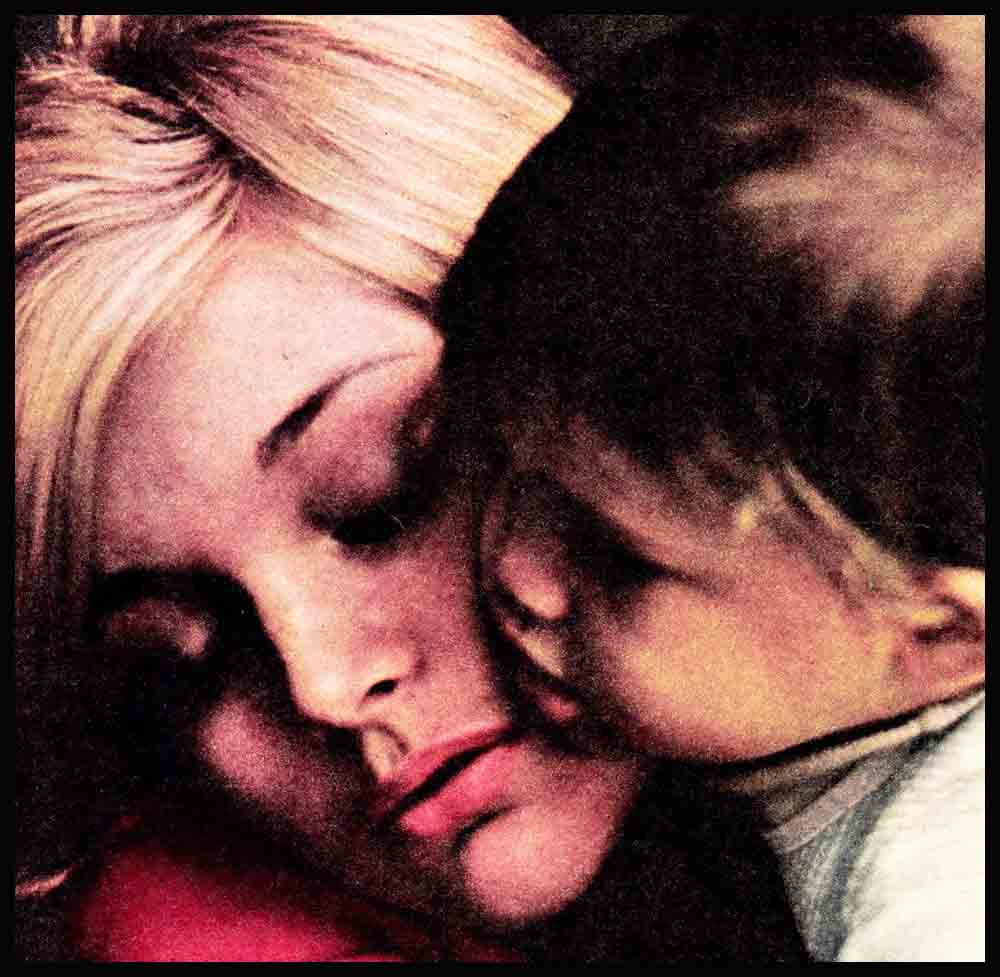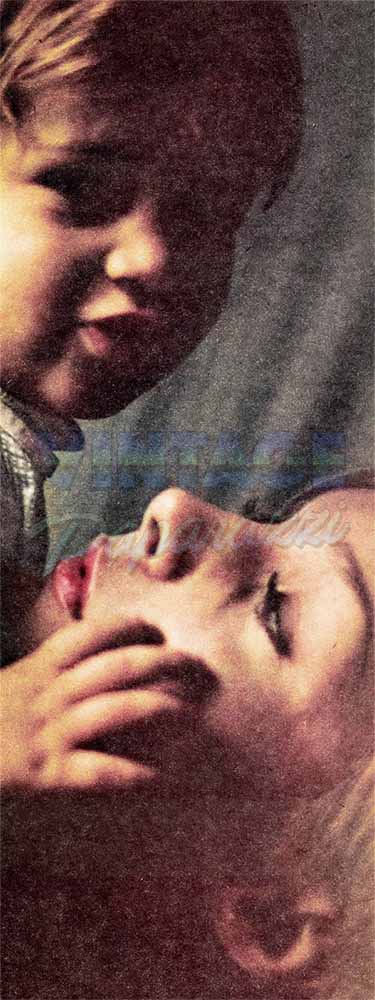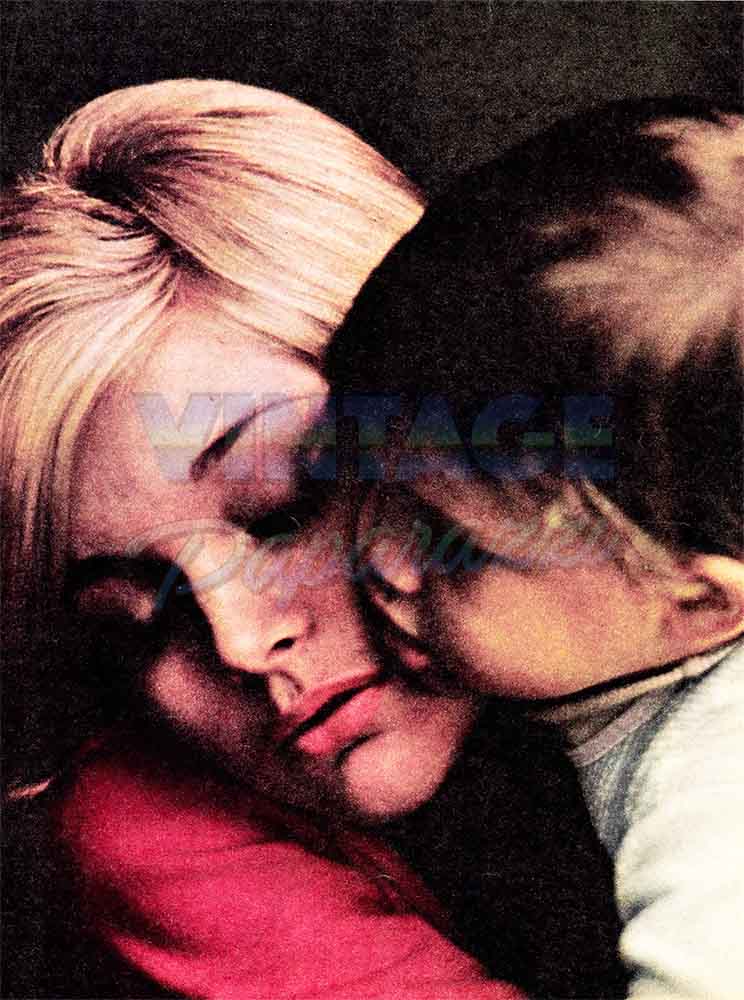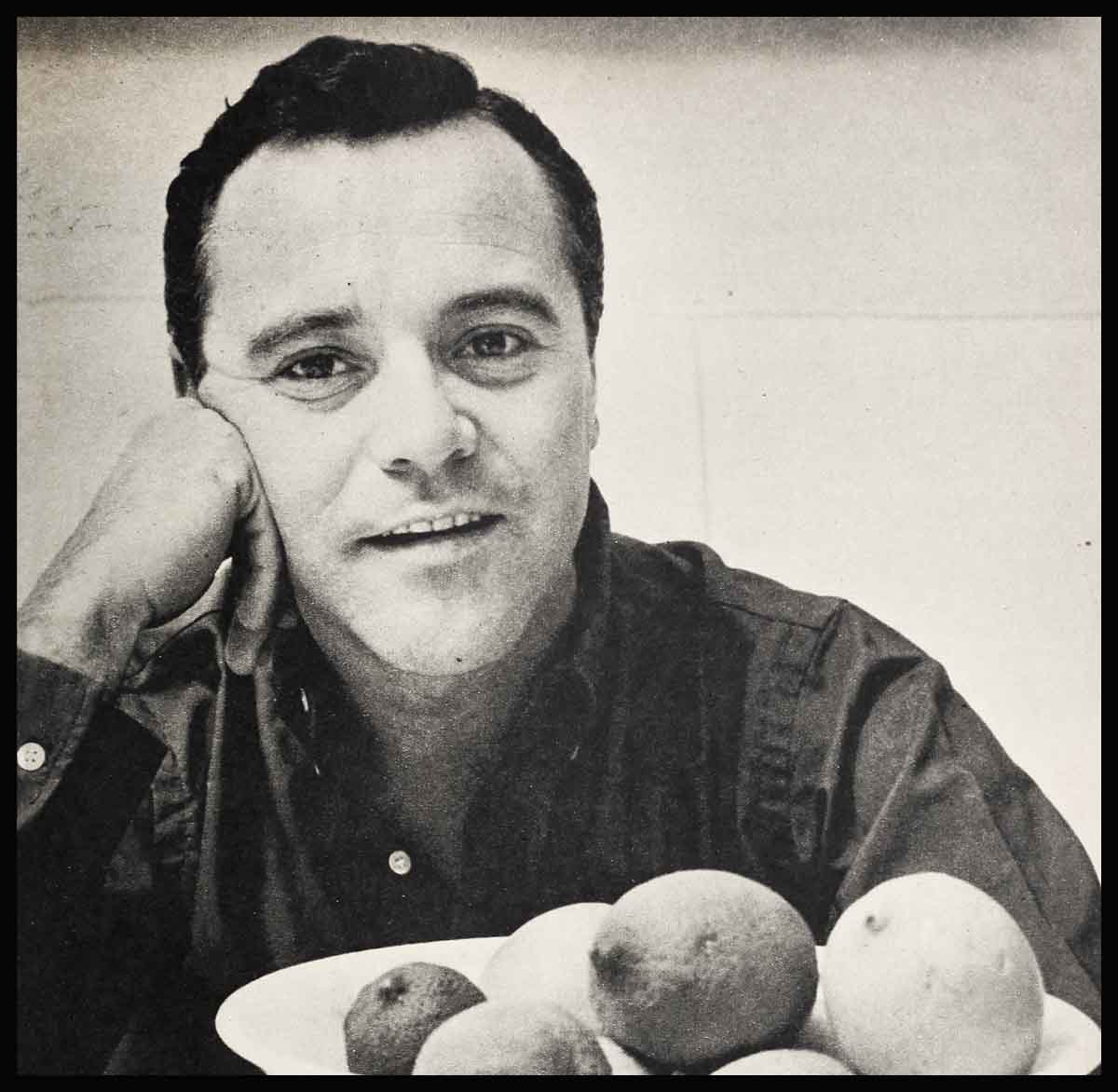
Carol Lynley’s Own Story
“I don’t really know what love is like,” Carol Lynley admitted wistfully. “Because l’ve never found it, except for my baby . . .” Her baby, Jill Victoria Selsman.
How ironic that Carol, whose husband had accused her of being an unfit mother, had found her only experience of love in motherhood! Young, beautiful, infinitely desirable, the last thing you’d think of Carol is that she’d have trouble finding love. What went wrong? Where has he been hiding all these years—the man who should have shown her what love really is? Carol doesn’t have the answer. Not that men haven’t let her know they desire her. Complete strangers ask her to go away with them for the weekend. and seem surprised when she expresses shock at their crude proposition. But love—real love between a man and a woman—no one has shown her what it means. And now, as a result of her disastrous marriage to Michael Selsman, there’s only a wound in her heart where love should be.
Whether the wound will heal and allow love to enter in. depends on many things—on luck. on Carol herself, and perhaps on a man she hasn’t met yet. But one thing is certain: Carol knows that a lifetime spent without love would be a futile, empty existence, no matter how successful her career might be. So she’ll never give up searching for it—no matter what disappointments and deceptions she may suffer, no matter how long the way.
AUDIO BOOK
From the beginning
Carol’s lifelong search for love began when she was a child. She now admits for the first time that it was a desperately lonely childhood. Most of it was spent without friends—and, perhaps most significantly, without a father to provide the first male love figure that most girls encounter. Her father, Cyril Jones, and her mother were separated when Carol was only two and divorced when she was eight. and she hasn’t seen him since. A year later her mother married Louis Orlando, but they were separated when Carol was twelve, although they weren’t divorced until a year ago.
So the fatherly love Carol needed was missing. And she was never really close to her mother or her brother Danny, who is two years younger than she. Carol was a completely different type of person than they were, and had little in common with them. This lack of closeness to her family—particularly to her mother—troubled her a great deal. But she didn’t know how to overcome it. troubled though she was.
“I never led a very normal life,” she told me. “I was very lonely. I had no friends. I started modeling when I was ten, and acting a few years later. I enjoyed my work—but there, too, I wasn’t close to the people around me. Most of them were older than I was.
“Actually I wasn’t able to communicate very well with people,” she admitted. “I find I still have a tendency to withdraw sometimes, but never the way I used to. I’ve always been basically a very shy person.”
She frowned. “Unhappiness affects you in many ways. When you’re really, really unhappy, you don’t appreciate things. Even after I started becoming successful, I never appreciated what I had—until my baby was born.”
Unable to communicate the thoughts and the longings and the need for love that she felt inside her—unable to express love herself, since no one had ever taught her how—Carol, before her marriage, was a prisoner, locked up behind the mask of her own beauty. There was a soul in there, yearning to love and be loved, but it was hidden from the world.
Looking desperately for an escape from this prison of the self, Carol thought she’d found it when she met Mike Selsman, a young press agent assigned by her studio, 20th Century-Fox, to work with her. He seemed to be a person with whom she could communicate at last—a person, above all, whom she could love.
“I thought I was in love,” she remembers now, “but I don’t think it was real love. I think it was infatuation.”
Erich Fromm seems to bear out Carol’s statement in his modern classic, “The Art of Loving.” In fact, he could almost be describing Carol’s case—though perhaps not Mike’s—when he writes: “If two people who have been strangers, as all of us are. suddenly let the wall between them break down, and feel close, feel one, this moment of oneness is one of the most exhilarating, most exciting experiences in life. It is all the more wonderful and miraculous for persons who have been shut off, isolated, without love. . . . However, this type of love is by its very nature not lasting. . . . Yet, in the beginning they do not know all this: in fact, they take the intensity of the infatuation, this being ‘crazy’ about each other, for proof of the intensity of their love, while it may only prove the degree of their preceding loneliness.” Whatever Mike may or may not have felt for Carol, certainly Fromm gives us a perfect description of what Carol felt for him.
Did Mike love Carol?
“No,” Carol believes. “Otherwise he wouldn’t have acted the way he did when we were married.”
How did he act? Carol says, “He seldom talked to me, and yet he wouldn’t let me see my friends. So I was lonely before my marriage and I was lonely during it.”


“If he had loved me . . .”
Could anything have been done to save this kind of marriage? “I don’t think our marriage had a chance from the day we got married,” Carol confesses. “If he had loved me, though, I think it might have worked out. For my infatuation would have grown into love. I think the ‘love’ you get married with is very different from the love that grows later—the love you live with for the rest of your life.”
Again, Erich Fromm in “The Art of Loving”—which Carol has never read—seems to back her up in distinguishing between these two kinds of love. For he speaks of “the confusion between the initial experience of ‘falling’ in love, and the permanent state of being in love.” He goes on to tie “falling” in love to infatuation. And he contends that love is an art which must be learned, like any other art, if it is to last.
In Carol’s case, Mike apparently never provided her with the opportunity to learn. Or so she believes. However, she doesn’t pretend to be blameless in the breakup of their marriage. “My biggest mistake was in marrying the wrong person,” she maintains. “But I thought I was in love with him, when actually I was looking for an escape from my unhappiness.
“I also made a mistake in letting him walk all over me. You see, when I got married, I was very conscious of a serious fault that I’d always had: being stubborn —too strong-willed. If I hadn’t been so stubborn, perhaps I’d have listened to all the people who told me that Mike wasn’t the man I should marry. But once we did get married, I leaned over backwards to avoid being stubborn in my relationship with Mike. And in doing so, I let him have his way in everything. He took advantage of it, and let his mother and his brothers and sisters interfere with our marriage. My mother-in-law trouble is a whole story in itself! To him, I was always wrong and she was right.
“If I’d stood up to him when we first were married, perhaps he’d have behaved better toward me and we could have had a happy marriage.
“But I was determined not to be stubborn—which, perhaps, was a form of stubbornness in itself!
“Another thing Michael wanted to do was change me. He tried to make me into something I wasn’t—an impossible combination of a nice little housewife who would stay home and clean, and a glamorous movie star who’d go out and make a lot of money so that we could have a big house.”
Carol denies that her interest in her career broke up her marriage. “I returned p to my career when I saw that my marriage was failing,” she insists. “I felt that perhaps if I worked a little bit. that would help. Nothing would have helped anyway—I see that now—but I tried. I had thought at first that my not working would make my marriage a happier one. But as it turned out, it was unhappy anyway, so I figured that going back to work wouldn’t make it any worse.”
Carol vehemently denies ever having made the statement attributed to her by an anonymous actress in a TV magazine, to the effect that nothing “. . . not my husband, not my daughter, not anybody— nothing is going to stand in my way” as far as her career is concerned. It’s a made- up quote, she insists.
But it is true that once Carol had returned to work, her career rapidly began to pick up steam—due not only to her looks and talent, but to an apparent shortage of young, attractive stars who can act, which makes stage-trained actresses like Carol especially valuable. Her success, however, has been marred by the bitterness of her separation from Michael, which occurred between the making of her two biggest pictures: the current hits “The Cardinal” and “Under the Yum Yum Tree.” This separation, instead of ending in the quick and friendly divorce that she had hoped for, has dragged on for nearly a year while she and Michael battled over a property settlement. She claims that he wants more of her money than he’s entitled to. “Someday I hope I can afford to pay him what he wants!” she says wryly.
“Money’s important to me,” she admits. “That’s because I’ve worked hard for mine since I was ten years old—and because I know what it means to be without it. And yet, when I got married I voluntarily gave my mother half of everything I had, because I wanted to—for I felt she was entitled to it. She never asked me for it.
“As for Michael, had he helped me earn it I would be only too happy to give it to him.
“But it’s money that I earned through no help of his, and I don’t feel he’s entitled to it.
“On the other hand, if it means that he would leave me alone and stop making my life miserable if I would give him some money, then I would give him money. But I would not give him half of everything I own, because that means less money for my child.”
Jill is today the center of her life, and to Carol she can do no wrong. “She’s happy, warm, loving and outgoing,” Carol enthuses. “She’s all over the house dancing and singing ‘la-la-la-la!’ Thanks to my baby, I’m not lonely the way I used to be. We go everywhere together—I take her to the park, and out shopping at the supermarket, and as a special treat we love to go out to lunch together at Linny’s Restaurant in Beverly Hills.”
How important is Carol’s career to her—the career for which Michael claims she broke up their marriage? “My career is very important to me. All I have now is my baby, myself and my career,” she pointed out. “I don’t have anything else. But if I had to choose between my career and my baby—my God, I’d choose my baby, because she’s worth a hundred careers! My baby is the most important thing in the world to me.”
Carol loves to go out to dinner and a movie, but until recently she only dated her agent Norman Brokaw, her publicist Guy McElwaine and a few old friends. Then, in late October, she also began dating Eddie Fisher, and they were seen dining together at La Scala in Beverly Hills. Actually, it wasn’t the first time they’d known each other. They had worked together in Eddie’s TV show several years previously.
But now they were brought together by a mutual friend.
As of this writing, it’s impossible to predict whether Carol’s relationship with Eddie will become serious. But she says she likes him and considers him “a very nice person.”
Neither Carol nor Eddie are rushing. When I asked her if the failure of her first marriage had made her cautious about marrying again, Carol retorted, “Yes, sir! I don’t think I can be too cautious. Even the mere mention of marriage makes me break out in a cold sweat. I had so much unhappiness with my first that I quake at the thought of the next.
“And yet I want to get married again, because I believe in it. I think marriage and children are the most important things in a woman’s life. And I don’t think I’m meant to live alone.
“But as far as any specific person or time, I get nervous at the very thought. I made one terrible mistake—I don’t want to make another!”
To avoid making just such a mistake, Carol has already given some thought to the kind of person she’d want for a husband if she ever married again. A capsule summary of her ideal husband would be: a man as little like Michael Selsman as possible.
And on the positive side she knew what she’d like in a husband:
“I think that when and if I ever get married again, I’ll marry a man much older and more mature. Then you’re dealing with an entirely different type of person, not an emotional little boy. I think a man who’s more mature will be able to understand me more—and I don’t think I’m an easy person to understand at all! And it should be a man who doesn’t have any mother problems, since that is the hardest thing in the world for a wife. Because you cannot compete—whatever you do is wrong!
“I also want a man who’s well established. a man I need more than he needs me. It’s hard to make a marriage work when the wife earns ninety per cent more than the husband. Because then you get into my case, where at first we lived on his salary and saved mine, and then we started using my money, too, and then it ended up with his attaching my bank account!”
It’s obvious that her first marriage has left Carol with a bitter taste in her mouth. But because she feels that love and marriage are vital to a woman’s happiness, she hopes that in time she will find the right man. Then perhaps she’ll be able to forget the unhappy experience she is still passing through, and go on to build a mature and lasting relationship with a man who will teach her what love really is.
—By James Gregory
Carol is in “The Cardinal” and “Under The Yum Yum Tree,” both Columbia, and “Shock Treatment.” for 20th Century-Fox.
It is a quote. PHOTOPLAY MAGAZINE APRIL 1964
AUDIO BOOK





No Comments